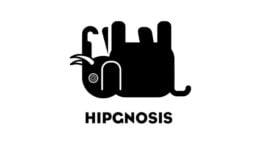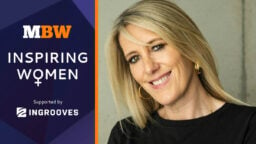MBW’s Inspiring Women series profiles female executives who have risen through the ranks of the business, highlighting their career journey – from their professional breakthrough to the senior responsibilities they now fulfill. Inspiring Women is supported by Ingrooves Music Group.
Talya Elitzer has spent the last four years building up her artist development company, Godmode, which has helped create multi-million dollar businesses for its clients and has recently launched a JV publishing company with Hipgnosis Songs.
Amongst the names on Godmode’s roster are JPEGMAFIA, who hit the Spotify US Top 10 chart with his most recent release, LP!, and Channel Tres, who features on the Grammy-nominated Disclosure album, Energy.
Other acts signed to Godmode include pop newcomer LoveLeo, singer/DJ/producer Yaeji and singer and rapper PawPaw Rod.
With a track record for breaking artists who don’t fit into pre-existing formats, Elitzer focuses on building multi-faceted portfolio careers that span touring, branding and merchandise.
The idea for today’s iteration of Godmode, which started off as an excuse to throw parties off the back of new releases, was born out of a desire to do more for artists than what Elitzer had experienced with record labels.
While working as an A&R for Capitol Records with Godmode as her side hustle, Elitzer was managing an artist named Shamir who signed to XL and helped shape her vision for the company.
“Working with labels is really hard sometimes,” she explains. “XL are very good at what they do but it was more of an old school perspective. They were very excited about getting a billboard in Shoreditch and we were like, ‘Cool, what about digital advertising?’
“The artist was recouped in his deal before the record even came out, which was the catalyst to what Godmode is today — we were like, ‘Oh, we should just be doing this ourselves and really developing artists’.
“Oftentimes, artists don’t know what the most special thing is about themselves and it’s our job to shine a light on that and help build a world around that.”
“Oftentimes, artists don’t know what the most special thing is about themselves and it’s our job to shine a light on that and help build a world around that. That’s what we pride ourselves on doing.”
Godmode is self-funded and has a number of partnerships with Universal, Warner and Sony for its artists. The company has offices in LA, which house studios and led to the launch of its publishing arm.
“So much of our business is very vertically integrated. There’s a really helpful and vibrant community of artists who are always coming in and out of the studios and, while we’re not necessarily trying to be a major publisher, we are really interested in expanding what we’re doing,” Elitzer says.
Writers signed to the publishing company include Godmode co-founder, songwriter and producer Nick Sylvester as well as Channel Tres and JPEGMAFIA.
On the management side of things, look out for a debut album from Channel Tres coming later this year, the emergence of a newly independent JPEGMAFIA (who was previously signed to Republic), as well as new talent, Latin dance music act MJ Nebreda.
Prior to Capitol, Elitzer started her career in the mailroom at William Morris where she graduated to booking agent under the guidance of Samantha Kirby Yoh (who has since joined UTA).
There, she worked on acts such as Bjork, LCD Soundsystem, Alicia Keys and Grace Jones.
Here, we discuss lessons learned across Elitzer’s career, tips for artist development and longevity, and much more besides.
What were the biggest lessons learned during your early career at William Morris and Capitol?
The biggest lesson I learned from Sam Kirby was how to move in the business; how to talk to people and how to present yourself. To still have success and be able to hang but with taste and credibility. In the music business, there’s no barrier to entry, you don’t need a certain degree, and so people handle themselves differently. Sam handled herself very elegantly and that was something I definitely learned from her.
At Capitol, [I learned that] major labels are very good at what they do but what they do is not artist development. As artists have become more powerful in this business and have more control over their careers, labels aren’t the ones necessarily pulling the strings in the way that they were 20/30 years ago. That means there’s a lot more responsibility put on the artist’s shoulders.
Major labels work more like venture capitalists than music companies at this point — they want to sign and be involved with stuff that’s already moving, rather than signing artists at an earlier phase and developing it from there. For me, I was excited about doing more of the creative work with artists and building out that part of their careers.
“To be an artist in 2022 is really, really hard. You’re a faceless name on a playlist with 200 other faceless artists and it’s really hard to stand out.”
To be an artist in 2022 is really, really hard. You’re a faceless name on a playlist with 200 other faceless artists and it’s really hard to stand out. A lot of the work that we take pride in doing is creating a world around each of our artists so that when you encounter one of them, it’s unmistakable and you’re like, ‘Holy shit, how did I not know this existed before?’
Do you have any tips for young managers who are looking to take on an entrepreneurial approach to artist development?
They should think about how they consume media. A lot of our philosophy is not about, ‘How do we send this email out to the most people possible?’ Or ‘How do we get this in front of the most people possible?’ Maybe if you’re in the top league of artists, if you’re Taylor Swift, that’s an excellent tactic. But if you’re an artist who’s smaller than Taylor Swift, which is most artists, for us, it’s about getting it to the right people first, rather than the most people, and being really strategic with that thinking and how projects are rolled out.
For instance, with Channel Tres, we didn’t spend $1 in the US until probably two years into his artist career. We purposefully only spent money in Australia and France, watched it trickle down from there and then started building it in the US. That really worked for him. And we only spent money on a specific kind of sketchy dance, DJ plugger who’s based in Ibiza because instead of using one of the big DJ promo companies who are going to blast it out to 10,000 DJs, we know that this guy parties with the right people and will get it played.
“I can send music to the head of editorial at Spotify, but maybe I shouldn’t, maybe I should send it to the 22-year-old who’s cool and whose taste people actually listen to.”
Yes, I can send music to the head of editorial at Spotify, but maybe I shouldn’t, maybe I should send it to the 22-year-old who’s cool and whose taste people actually listen to and then watch it work better in the system. A lot of these decisions really make an impact in a campaign.
We like to be very deliberate about how we present things in the world. For young managers, I think that’s a way to think about it, too, that feels like things are more within your control.
As you’ll know, there’s what seems like an endlessly ongoing debate about lack of revenues from streaming, particularly for songwriters. How do you navigate that challenge with the artists and songwriters you’re working with?
Kind of along the same lines of what I said earlier, it’s about actually looking at where the dollars come from. It’s really interesting to see what DSPs pay more than others and how to prioritise that. I don’t know if people know that Peloton pays very well in royalties, for example, and so maybe we should be super-serving Peloton.
We’re actively aware of the conversations that are happening and the politicians who are going to try to help the songwriting community. But it is what it is for now. We just try to empower our songwriters and artists to put them in a position where they can have the most success.
Do you have a proudest moment across Godmode’s history to date?
I have a recent one. I was putting up a tour for JPEGMAFIA last fall and we were meant to announce the tour right in the moment when I was hearing from everyone that ticket sales had completely stalled because the Delta variant was everywhere.
His fans are pretty diehard so he was in a decent position anyway but I was still nervous about it so we came up with an idea of how to really invigorate his fanbase. He has a pretty crazy community of kids who are all on Reddit so we had JPEG infiltrate Reddit dropping hints, never before seen photos of him and then new music.
We basically did a secret pre-sale that was not announced anywhere, not on socials, nothing, only for those Reddit fans that he personally gave the information to. We sold over 80% of the tour through that pre-sale. I was really proud of that whole campaign because it was a little different and my team did an amazing job of executing it and getting those kids excited.
We’ve spoken about how to get artist careers going at the beginning — how do you achieve longevity?
It’s really about building community. And it’s about being thoughtful about what the long term goal is and then backtracking the steps you need to take in order to get there.
“[longevity is] about building community, being thoughtful about what the long term goal is and then backtracking the steps you need to take in order to get there.”
What’s crazy about working in music is that people forget that music is the actual product. We are selling music and there are a lot of businesses that grow or spawn based on that music. So we are extremely thoughtful about, ‘What does the music sound like? Who are the influences? How do we reach these types of people? Maybe there should be a more acoustic song on this project because then we can tap into this community’. It’s those types of creative decisions that allow artists to move in a lot of different directions as their careers evolve.
Also, working on different verticals for artists. If we learned anything from the pandemic, it’s that you can’t count on one specific vertical — touring was not a thing for a long time. And all of our artists were okay because they have a lot going on and we’re very lucky to be in that position. So it’s about building out a holistic world for your artists, rather than just counting on, ‘I’m going to play this many gigs or I’m going to get this much from streaming’. You have to look at everything holistically.
What’s the most exciting development happening in the music industry today?
People get bummed out by streaming and yes, streaming is really hard and getting playlisted is really hard. You’re fighting with tens of thousands or hundreds of thousands of songs that are submitted every day. Competition has never been fiercer but I think there’s also a lot of opportunity.
In the pandemic, everyone had to pivot and figure stuff out and another thing that I’m really proud of is what we did for Channel Tres. He’s a very buzzy artist right now, he had been touring with Childish Gambino and Robyn and had songs that were starting to bubble. He had an incredible year of festivals and touring lined up, COVID hit and we were like, ‘How are we going to get him in front of all these different people now they’re not seeing him at shows?’
“In the pandemic, everyone had to pivot and figure stuff out.”
We thought about how to get these algorithms to work for us and used a tactic that worked. He’s an artist who collaborates a lot with other artists and gets asked to do a lot of features. So we basically said yes to almost every feature that was presented to him. He did stuff with Disclosure and Tyler, the Creator but he also did stuff with smaller artists who are less known. He collaborated with an Australian DJ duo called Flight Facilities — a feature we almost didn’t do — and he did this enough times that his monthly listeners went up by probably two million.
The number of his Discover Weekly’s went up and when he drops his first LP this year, he’s in an incredible position. We made the algorithm work for us by getting in front of different communities on these platforms. I think you can choose to get bummed out by these platforms, which I certainly have my days of, but there are ways to have them work for you as long as you can be creative about how you think about it.
What would you change about the music industry and why?
It’s never been better to be a woman in the music industry but, at the same time, it’s still really hard to be a woman in the music industry. I had incredible mentors, like Sam Kirby, as a younger person starting out but I think there needs to be more women in powerful positions who can help younger women come up, both artists and executives.
“When I worked at Capitol, I’d be in a boardroom of 40 plus people and it would be me and maybe one other woman at the table. There’s still a long way to go.”
When I worked at Capitol, I’d be in a boardroom of 40 plus people and it would be me and maybe one other woman at the table. The only other women at the table were the assistants around the outside. There’s still a long way to go.
Do you have any advice for someone starting out in the music business today?
It’s really important to go out, meet people, learn about what they do and ask questions. You’d be surprised at how many people are open to getting on a phone call or grabbing a coffee with you to answer questions about how they started out — people love to talk about themselves. It’s not about asking for anything from them, it’s about making the connection.
More importantly even than that is to make connections with your peers. The people I started out with, pushing a mail cart, are really big agents and managers across the industry and many of them are still my closest friends. It’s really important to build relationships with people who are at your level because even though none of you really have connections at that point, you can help each other as you grow.
MBW’s Inspiring Women series is supported by Ingrooves Music Group, which powers creativity by providing distribution, marketing and rights management tools and services to content creators and owners.Music Business Worldwide





